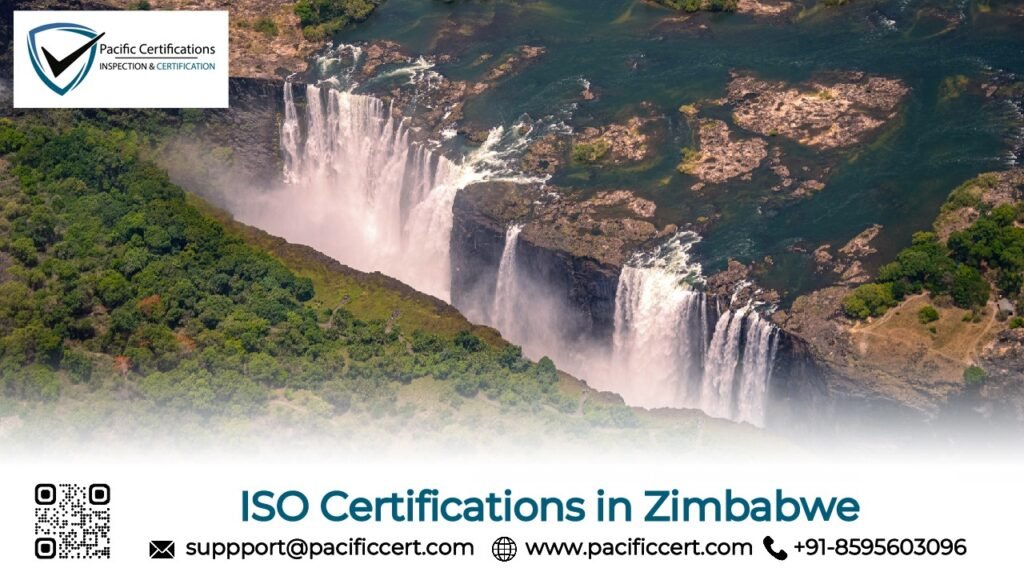
ISO Certifications in Zimbabwe, Popular Standards Requirements and Benefits
ISO certifications have become an essential part of maintaining global standards and enhancing business operations. In Zimbabwe, companies across various industries are turning to ISO standards to improve quality & boost efficiency. ISO standards provide universally accepted guidelines and frameworks that ensure quality, safety, and efficiency across industries. Zimbabwe, as part of a rapidly evolving global economy, has embraced these standards to align with international practices.
The government and private sectors are increasingly recognizing that compliance with ISO certifications strengthens local enterprises’ credibility and enables them to access global markets. In a market where trust and accountability are paramount, companies that adopt these certifications distinguish themselves by demonstrating a commitment to quality and efficiency.
ISO standards play a vital role in Zimbabwe’s development goals. From manufacturing to healthcare and education, these certifications are driving operational improvements and ensuring alignment with global standards.
Contact us at support@pacificcert.com to schedule your audit and certification!
Popular ISO Standards in Zimbabwe
Several ISO standards have become prominent in Zimbabwe, catering to different sectors and organizational needs. Below is an overview of the most popular ones:
ISO 9001: Quality Management System (QMS): ISO 9001 ensures that companies provide consistent quality products and services. Businesses in Zimbabwe are increasingly adopting this certification to meet customer expectations and enhance operational efficiency.
ISO 14001: Environmental Management System (EMS): With the growing focus on sustainability, ISO 14001 certification helps businesses in Zimbabwe reduce their environmental impact. This is crucial as companies align their practices with eco-friendly operations and national environmental policies.
ISO 45001: Occupational Health and Safety (OH&S) Management System: In Zimbabwe’s industrial and mining sectors, occupational safety is paramount. ISO 45001 ensures safe working conditions by helping companies identify risks and implement safety measures, minimizing workplace incidents.
ISO 27001: Information Security Management System (ISMS): As digital transformation accelerates, businesses in Zimbabwe are increasingly at risk of cyber threats. ISO 27001 certification ensures that organizations adopt best practices to secure their information and prevent data breaches.
ISO 22000: Food Safety Management System (FSMS): Zimbabwe’s agricultural and food industries must maintain high standards of food safety to ensure consumer health. ISO 22000 ensures that companies follow stringent food safety guidelines and deliver safe products to the market.
ISO 50001: Energy Management System (EnMS): Energy-intensive industries in Zimbabwe are adopting ISO 50001 to optimize energy use and reduce operational costs. This certification supports businesses in their transition to sustainable energy solutions.
Click here to find out more applicable standards to your industry
Achieve global standards with ISO certification for your business in Zimbabwe. Get in touch with us at support@pacificcert.com or +91-8595603096 for expert certification services.
Market Trends
In this year, the trend toward ISO certifications in Zimbabwe is expected to grow, driven by international trade agreements and rising consumer expectations for quality and safety. Several industries, including agriculture, manufacturing, and telecommunications, are reporting an uptick in ISO certification adoption to meet export demands and local regulatory requirements.
Notably, with Zimbabwe’s participation in the African Continental Free Trade Area (AfCFTA), companies are compelled to align with global standards like ISO. This compliance helps businesses unlock new trade opportunities across Africa. The ongoing digital transformation has also fueled demand for ISO 27001 certification to safeguard sensitive data against cyber threats.
Looking to boost your business credibility with ISO certification? Contact Pacific Certifications at support@pacificcert.com or call us at +91-8595603096 for professional certification audits.
How We Can Help
At Pacific Certifications, we specialize in providing ISO certification audits and certification issuance services. We ensure that your organization meets the required standards through comprehensive and transparent audits.
Our process involves:
- Initial audit: A thorough review of your organization’s processes and compliance levels.
- Certification issuance: Once all requirements are met, we issue the ISO certification.
- Surveillance audits: We conduct periodic audits to ensure continuous compliance.
If you’re ready to boost your company’s reputation and align with international standards, Pacific Certifications is your ideal certification partner. Reach out to us at support@pacificcert.com or phone +91-8595603096 to start your journey toward compliance!
Requirements of ISO Certifications in Zimbabwe
Each ISO standard has specific requirements that organizations need to fulfil to gain certification. These standards focus on various areas, from quality management to environmental sustainability and information security. Below is a detailed breakdown of the key requirements:
ISO 9001: Quality Management System (QMS) Requirements
- Context of the organization: Define internal and external factors that influence the QMS.
- Leadership involvement: Top management must demonstrate commitment and ensure quality objectives are aligned with the organization’s strategy.
- Risk-based thinking: Identify risks and opportunities to improve the processes.
- Customer focus: Understand customer needs and consistently meet their requirements.
- Documented procedures: Maintain policies and records for monitoring the quality process.
- Performance evaluation: Use internal audits and performance metrics to assess and improve the QMS.
ISO 14001: Environmental Management System (EMS) Requirements
- Environmental policy: Develop and document a clear environmental policy.
- Identification of environmental aspects: Identify how the organization’s activities impact the environment (e.g., energy use, waste).
- Legal compliance: Ensure compliance with environmental laws and regulations.
- Environmental objectives: Set measurable goals to improve environmental performance.
- Continuous monitoring: Track and measure environmental impacts regularly.
- Emergency preparedness: Develop procedures to handle environmental emergencies (like chemical spills).
ISO 45001: Occupational Health and Safety Management System (OH&S) Requirements
- Hazard identification and risk assessment: Identify risks and hazards in the workplace.
- Worker involvement: Engage workers and their representatives in safety practices.
- Legal and regulatory compliance: Ensure compliance with health and safety regulations.
- Training and awareness: Train employees to identify risks and follow safety procedures.
- Emergency preparedness: Develop emergency response plans.
- Performance monitoring: Use audits and evaluations to ensure the effectiveness of safety measures.
ISO 27001: Information Security Management System (ISMS) Requirements
- Information security policy: Develop policies for protecting data and managing risks.
- Risk assessment and treatment: Identify security risks and define controls to mitigate them.
- Asset management: Maintain an inventory of information assets and ensure they are protected.
- Access control: Implement measures to control access to sensitive information.
- Incident management: Develop procedures to manage security breaches.
- Regular audits and continuous improvement: Conduct audits to ensure compliance and identify areas for improvement.
ISO 22000: Food Safety Management System (FSMS) Requirements
- Food safety policy: Establish a policy to ensure the safe production of food.
- Hazard Analysis and Critical Control Points (HACCP): Identify hazards and define control measures.
- Supply chain management: Monitor suppliers to ensure safe food handling throughout the chain.
- Compliance with food safety regulations: Ensure all legal food safety requirements are met.
- Training and awareness: Provide training to employees on food safety practices.
- Traceability system: Implement systems to trace and recall products if needed.
Each of these ISO standards provides a structured framework for improving different aspects of an organization’s operations—be it quality management, environmental responsibility, workplace safety, data security, food safety, or energy efficiency. Following these requirements ensures compliance and boosts organizational performance across multiple domains.
Need ISO certification to grow your business in Zimbabwe? Contact Pacific Certifications at support@pacificcert.com or call +91-8595603096 for seamless certification services.
Benefits of ISO Certifications in Zimbabwe
Achieving ISO certification offers numerous benefits, including:
Credibility and Market Access: ISO certifications demonstrate your company’s commitment to quality and safety, improving your reputation and opening new markets, especially for export businesses.
Efficiency: Standards like ISO 9001 and ISO 14001 promote streamlined processes, reducing waste, and optimizing resource use.
Compliance: ISO-certified companies are better equipped to meet both national and international regulatory requirements, minimizing legal risks.
Customer Satisfaction: By adopting ISO standards, businesses can ensure consistent quality, leading to higher customer satisfaction and loyalty.
Risk Management: Standards such as ISO 45001 and ISO 27001 ensure proactive risk management, promoting safety and cybersecurity.
Call us at +91-8595603096 or send an email to support@pacificcert.com to begin the certification process!
Who Needs ISO Certifications in Zimbabwe?
ISO certifications are suitable for a wide range of industries and organizations in Zimbabwe. Some examples include:
- Manufacturing companies seeking to meet global quality standards (ISO 9001).
- Healthcare organizations aiming for better patient safety (ISO 13485).
- Agricultural producers and food businesses focused on food safety (ISO 22000).
- IT firms managing sensitive information (ISO 27001).
- Construction and mining companies improving workplace safety (ISO 45001).
- Government institutions enhancing operational transparency and efficiency.
Organizations of all sizes, from small businesses to large corporations, can benefit from ISO certification to improve operations and gain a competitive edge.
ISO certifications play a crucial role in ensuring quality, safety, and efficiency across industries in Zimbabwe. By adopting ISO standards, businesses can improve their operations and unlock new market opportunities. With Pacific Certifications, achieving these global standards has never been easier. Contact us today to begin your ISO certification journey and set your business on a path to sustainable growth!
Pacific Certifications is accredited by ABIS, in case you need support with ISO certification for your business in Zimbabwe, please contact us at support@pacificcert.com or +91-8595603096.
FAQs: ISO Certifications in Zimbabwe
ISO certification ensures that organizations follow international standards for quality, safety, and efficiency, improving operations and enhancing trust.
The time to achieve ISO certification depends on the organization’s readiness and the specific standard. Typically, the process can take several weeks to months.
No, Pacific Certifications specializes in audits and certification issuance. We do not offer consultancy, implementation, or training services.
Industries such as manufacturing, agriculture, healthcare, IT, and construction benefit significantly from ISO certifications, as these sectors often face strict quality and safety requirements.
ISO certifications are generally valid for three years, with annual surveillance audits to maintain compliance.
If a company fails an audit, Pacific Certifications will provide a non-conformance report, allowing the organization to address the issues and undergo a follow-up audit.
Read More at: Blogs by Pacific Certifications







